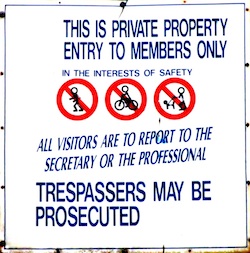 Despite its introduction over a year ago, the criminal offence of squatting by section 144 of the Legal Aid, Sentencing and Punishment of Offenders Act 2012 remains a controversial law in that it still only extends to residential property.
Despite its introduction over a year ago, the criminal offence of squatting by section 144 of the Legal Aid, Sentencing and Punishment of Offenders Act 2012 remains a controversial law in that it still only extends to residential property.
A building is residential if it is “designed or adapted, before the time of entry, for use as a place to live”. There is considerable scope for disagreement over whether certain properties are caught by the offence. We have already faced a situation where police refused to deal with squatters in an empty public house on the basis that it was not residential, notwithstanding that the squatters were likely to be occupying the residential parts as opposed to the bar area.
The offence of squatting is committed if a person (a) is in a residential building as a trespasser; (b) knows or ought to know that he or she is a trespasser; and (c) is living in the building or intends to live there for any period. A person found guilty of the offence is liable on conviction to up to 6 months imprisonment, a fine of up to £5,000 or both.
Initial concerns about loopholes in the offence (for example by a squatter claiming to have been granted a tenancy of the property) and lack of resources on the part of the police to adequately enforce the offence appear not to have materialised. By as early as March 2013, the SQUASH (Squatters’ Action for Secure Homes) campaign reported that there had been 33 arrests. In reality, it is likely that the police will have moved on considerably more squatters but without charge.
Owners of non-residential property can only involve the police if there are clear signs of criminal damage. In our experience, even then the police are notoriously reluctant to get involved and signs of forced entry will generally not be sufficient.
As such, those owners will have to rely on civil remedies to remove the squatters. The options are either standard summary possession proceedings or an application for interim possession order (IPO), both of which involve at least one trip to court.
The most commonly used of the two is the summary possession proceedings. A claim is issued in the local county court and, in the case of non-residential property, the squatters must be given at least 2 days between service of the claim and the hearing date. In practice, it is usually considerably more - it can often take at least 2 weeks to get to a hearing. The court should make a possession order requiring the squatters to give up possession of the property immediately. However, if left to the county court bailiffs to carry out the eviction, this can take several more weeks. For that reason, it is often preferable to have the claim transferred to the high court so that an eviction can be carried out by high court enforcement officers. This will result in a much speedier eviction, although at considerably greater cost.
The procedure for obtaining an IPO also involves an initial hearing in which, all things being well, the court will make the IPO. Once served with the IPO, the squatters will have 24 hours to leave the property failing which they are committing a criminal offence. A further hearing will be arranged by the court in which the court will decide whether to make the IPO final.
Both processes take time and involve the owner incurring costs, which it is highly unlikely to be able to recover from the squatters. In the meantime, there could well have been a significant impact on the owner’s business. For example, it may delay a development leading to late costs, hold up or even cause a transaction to abort or damage may be caused to the property itself by valuable features being stripped out.
A common concern voiced during the government consultation was that criminalising squatting of residential property only would lead to an influx in squatting of commercial properties and certainly that appears to have been the case. That increase has led to calls for the law to be extended to cover commercial property, including recently from some senior MPs to justice secretary Chris Grayling. MPs have highlighted a couple of examples in Lambeth – 111 Westminster Bridge Rd where squatters reportedly caused in excess of £100,000 worth of damage and Patmos Lodge where the eviction costs are said to have amounted to £150,000.
It remains to be seen whether or not the government will extend the criminal offence to commercial properties. It appeared to leave the door open to do so in its response to the consultation describing the introduction of section 144 as a “first step”. It is certainly difficult to see the rationale for excluding commercial property from the offence. However, there is considerable opposition by squatting advice organisations and homeless charities.
In the meantime, property owners are well advised to take preventative action, by increasing security in vacant buildings, disconnecting utilities, where possible removing fixtures and fittings that make the property more desirable for squatters and even looking at agreeing temporary rent-free occupancy arrangements.
About the author
 Laura Checkley is a partner in the real estate disputes team at Pemberton Greenish LLP. She specialises in all aspects of commercial and residential property disputes including landlord and tenant litigation, claims against trespassers/squatters, property related insolvency and professional negligence, adverse possession and boundary disputes. @pg_law
Laura Checkley is a partner in the real estate disputes team at Pemberton Greenish LLP. She specialises in all aspects of commercial and residential property disputes including landlord and tenant litigation, claims against trespassers/squatters, property related insolvency and professional negligence, adverse possession and boundary disputes. @pg_law
The November features in Property News magazine include articles about how to get new business leads...
Have you any commercial property events you'd like to tell us about? It could be networking, exhibitions, seminars, industry lunches or sporting fixtures. We will list them for free. Just email newsdesk@propnews.co.uk with the following details: Event name, date, time, venue, cost, booking info and a brief description of the event.
To list your property job vacancies on Property News. Email: richenda@propnews.co.uk.